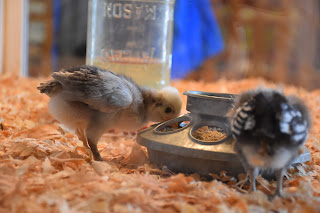WSDA Field Veterinarian, Avian Health Lead
 |
| The vND virus can infect many bird species including chickens, turkeys, ducks, geese, and game birds. Infected birds shed large amounts of virus in respiratory fluids and feces. |
Disease not detected in Washington
So far, no backyard flocks or commercial poultry operations in Washington have detected diseased birds associated with this most recent outbreak of the deadly poultry disease.
Virulent Newcastle disease is not a food safety concern. No human cases of Newcastle disease have ever occurred from eating poultry products. Properly cooked poultry products are safe to eat. In very rare instances, people working directly with sick birds can become infected with mild symptoms, such as conjunctivitis.
Eradication efforts
In California, virulent Newcastle disease has continued to spread since in was detected in May.
There had been 234 cases involving backyard birds in California this year despite eradication efforts by USDA-APHIS and the California Department of Food and Agriculture (CDFA).
Last week, USDA confirmed the presence of vND in a commercial chicken flock in Riverside County, California. The sick flock was completely depopulated within 24 hours of the positive finding. It was first case found in commercial poultry since 2003.
Keep virulent Newcastle disease out of Washington
Because the disease spreads quickly and represents a major economic risk to the poultry industry, WSDA asks local poultry growers and those with backyard flocks to keep their guard up.
One of the most likely pathways for the disease to find its way into Washington is a pet bird such as a parrot, said Washington State Veterinarian Brian Joseph. Exotic birds often carry the disease without visible symptoms.
Poultry owners and veterinarians should be familiar with the clinical signs and actions to take if the disease is suspected. Report any cases to the WSDA Sick Bird Hotline at 1-800-606-3056.
How can I protect my flock?
Virulent Newcastle Disease (previously Exotic Newcastle Disease) is a viral disease that affects all species of birds. Its primary mode of transmission is aerosols and / or direct contact with infected birds and their saliva or feces. The disease has a rapid onset, with an average of 5 days post exposure, and can be fatal. Besides respiratory secretions, the virus can be found in bedding, contaminated food / water, or on farm equipment and clothing. Therefore, it is essential that all flock owners have sound biosecurity practices in place.
Clinical signs to look for:
• Sudden, unexplained death in the flock or high mortality
• Coughing, sneezing, gasping for air
• Depression, decreased appetite, green diarrhea
• Changes in egg production
• Paralysis of the legs or wings, twisting of the neck, tremors, circling
• Swelling around the eyes and neck
** vND may cause transient conjunctivitis (“pink eye”) or flu like symptoms in humans. Properly cooked poultry products are safe to consume.
Don’t delay, report sick birds right away.
• WSDA Avian Health Program Sick Bird Hotline: 1-800-606-3056
• Your local veterinarian
• Washington Animal Disease Diagnostic Lab (WADDL): 509-335-9696
• Avian Health and Food Safety Lab (AHFSL): 253-445-4537
**Veterinarians - It is extremely important that oropharyngeal samples are submitted to the laboratory for an accurate diagnosis and the owner takes precautions to limit the spread of disease in the meantime. Please call Beth Reitz at the State Veterinarian’s office if you have questions or would like to discuss an unusual case: 360-725-5494.
Disease prevention starts with good biosecurity practices:
• Purchase birds from National Poultry Improvement Plan (NPIP) hatcheries or producers
• Isolate new birds from the rest of the flock for at least 30 days. This also applies to birds returning from fairs or shows
• Restrict traffic onto and off of your property and avoid visits to other poultry operations; especially during an outbreak
• Have dedicated clothing and boots for use in the poultry area
• Isolate sick birds and visit them last during daily operations such as feeding or egg collection
• Disinfect clothes, boots, equipment and wash hands after handling poultry
• Keep poultry houses and feeders clean and provide a fresh water source
• While there is a vaccine for vND, it may not prevent the disease
Please visit USDA Bulletin for more information about virulent Newcastle disease.
